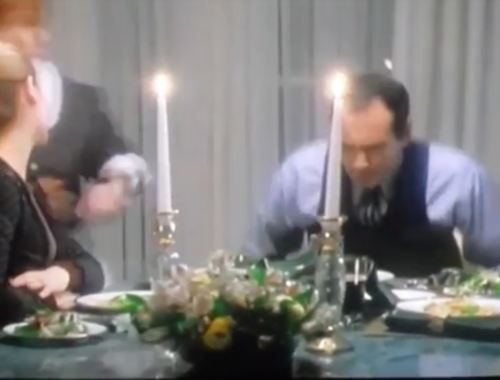Dan Hedaya has played many parts in his decade-spanning career, among the most important being Richard Nixon in Dick, but his most valuable of all is unequivocally Mel Horowitz, a.k.a. Cher Horowitz’s brusque, teddy bear-underneath-it-all patriarch in Amy Heckerling’s seminal 1995 movie, Clueless. A lawyer who gets paid what was then a whopping $300 an hour to argue with people, Mel does his best to make time for his vapid but well-meaning daughter, especially since he’s doing the single dad thing, an endlessly chic part to play in film and in life during the 90s. As part of that attempt, he occasionally actually makes his daughter sit down to what he venomously calls a “nice family dinner.”
Being the type of enforced activity that can be likened to a boss at a workplace insisting upon “mandatory fun” as a means to bond, the forced family dinner in suburbia, similarly, yields very little in the way of desired results. For whenever something is “inflicted,” it can only ever feel like a punishment. Something to be endured for the sole sake of it finally being all over. Cher, good sport that she is, however, is accustomed to Mel’s fits and barkings, even if her new protégée, Tai (Brittany Murphy), is not–somewhat startled by Mel’s brash and abrupt manner as he demands no distractions (like phones) at the table. Of course, without these distractions, it becomes very apparent that there is nothing to say, no common ground between parent and child, least of all when that child must come to terms with perhaps only “liking” her parent for the financial gain it can bestow. So it is that Mel resorts to the old chestnut during the awkward moment of silence that follows his command, “So, uh, what’d you do in school today?”
Cher, seemingly all too keen to make him regret his attempt at engaging in a conversation with her, muses, “Well, I broke in my purple clogs.” However, in typical parental hypocrisy, when Mel’s own communication device goes off, he decides it’s fine for him to take the call because it’s business–money. The most important thing of all, particularly in Beverly Hills. Which is, to be sure, like suburbia on acid. For while it might be part of the “major metropolis” that is L.A., it is, for all intents and purposes, the very core of what a suburban milieu represents: affluence, living in a bubble and repression to the extreme. Repression, mind you, is something that white people with money have the monopoly on in terms of supreme mastery. While that repression can sometimes take shape in the form of the perpetual rage and surliness that emanates from Mel’s core, it often exists in the quietude of these types of artificial and begrudging dinners. The dinners that only come to pass as a result of some congenital commitment to a bygone meaning of family, a concept, in many respects, initially perfected by the suburban set circa the 1950s, before the decay that infiltrated said areas and notion turned the suburban family on its ear, mirrored it back to itself as some grotesque simulacrum of emotion. Emotionlessness, rather.
Though Clueless manages to parody this phenomenon to comical effect, the underlying fact remains that to perform the act of the “nice family dinner” is just that: a performance. And it’s often one that becomes increasingly difficult to “get it up” for as one grows older. Not that it was ever all that facile to perform during adolescence either. Cher just makes it look so as a result of her blithe oblivion to reality. Another symptom of inhabiting suburban environs.



















